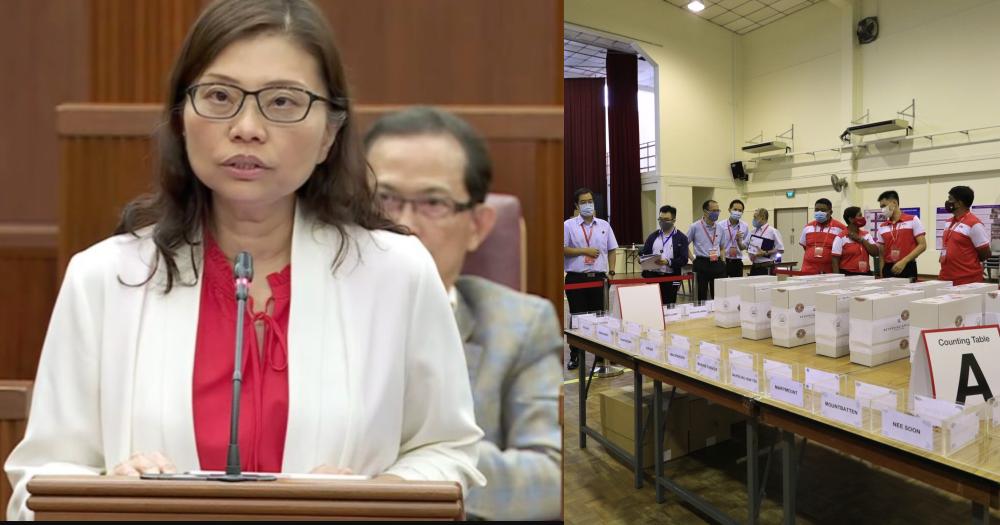On Jul. 5, 2023, the Progress Singapore Party (PSP) proposed abolishing Parliament's Group Representation Committee (GRC) system.
After a debate that lasted about three-and-a-half hours, Parliament voted against it in a voice vote.
PSP's objections to the GRC system
The motion was introduced by Non-Constituency Member of Parliament (NCMP) Hazel Poa.
Poa said that the justification for GRCs is to safeguard minority representation in Parliament. While she agreed that such a goal was laudable, she believed the GRC system brings other "undesirable" consequences.
Poa listed what the PSP saw as several problems with the GRC system, particularly that its results in sub-optimal electoral outcomes, slows the development of a balanced political landscape, reduces voter influence on elections, and seats in GRCs made vacant cannot be filled unless the entire slate of MPs vacates their seats.
She also said:
"PSP is confident that Singaporeans do not vote along racial lines, and minority candidates are well able to win elections on their own merits.
Even though the majority of voters are Chinese, many non-Chinese candidates have won elections."
Poa then listed five occasions since 1984 where minority candidates have won in SMCs against majority candidates.
But if the ruling PAP was "not convinced", she suggested two possible alternative voting systems that might be used to ensure adequate minority representation in parliament.
- "NCMP scheme for minorities" where should insufficient numbers of minority candidates be elected, the best-performing losers amongst minority candidates will become NCMPs.
- A Proportional Representation system, where seats might be allocated through vote share, with stipulations of minimum minority representation requirements.
Her fellow PSP member, Leong Mun Wai, also recounted his issues with the GRC system, suggesting that both the GRC and Elected Presidency systems had been introduced to "entrench its (the PAP's) political dominance".
He also listed a number of ways "GRCs can be used to maximise the PAP's political advantages", such as the redrawing of electoral boundaries or demographic targeting.
"I will conclude by saying that from a democratic standpoint, the GRC system ought to be regarded as one of the most undesirable electoral rules in the world.
It magnifies the seat share of the PAP beyond its voting strength and creates opportunities for the manipulation of electoral boundaries for partisan purposes.
Over time, it breeds cynicism and disillusion in our political system as the views of the public are not properly reflected in the election results."
Leong also questioned whether the GRC system was still being used to fulfil its original purpose, while also questioning what that original purpose was.
Debate
The debate was spirited, with three Nominated Members of Parliament rising to say they would not vote for the motion, crediting the GRC system as an effective, though imperfect, way of protecting minority representation.
Multiple PAP MPs and Education Minister Chan Chun Sing also spoke about why they would not vote on the motion, with Chan opposing the PSP's alternatives, saying it risked having parties formed along racial or religious lines, or special interests.
However, Worker's Party Chief (WP) Pritam Singh said that his party supported the motion. While Singh acknowledged that the GRC system had "some part to play" in fostering high levels of interracial trust and the importance of multi-racialism, he said the GRC system added to "cynicism" when closely-fought SMCs were absorbed into GRCs.
PAP's Murali Pillai, who Poa cited as proof that a minority candidate could win a Single Member Constituency seat, shared his experience of running as a minority candidate and the difficulties he faced during his campaigns, where he encountered multiple instances of racism.
He noted that he had encountered several troubling occurrences, including what appeared to be a death threat.
Racism should be tackled holistically: Hazel Poa
Poa, in her closing speech, thanked Murali for sharing his experiences, acknowledging the presence of racism in Singaporean society:
"I think we all recognise that and to totally eradicate, it is probably not practical even though we would all try our best to minimise that as far as possible.
But I think the point is that they did not succeed, even though they tried to play the race card.
So even though that racism does exist, but it is not to the extent that it actually affects election outcomes."
MP for Pasir Ris - Punggol GRC Sharael Taha picked her up on her response, asking if it implied:
"That she's asking minority candidates and future minority candidates to accept such initial abuse, because it may not matter and because he may win in elections."
Poa rejected the characterisation, saying she was not suggesting that minority candidates accept such treatment, only that racism needed to be "tackled holistically".
Clarifications
Before the vote, Poa clarified that there was no disagreement on the importance of multiracial representation in Parliament, only differing on how to ensure it.
She also reiterated Leong's point, questioning if the purpose of the GRC system was truly about minority representation, suggesting that the GRC scheme had not significantly affected minority representation in Singapore while making opposition representation significantly more difficult.
Poa said that the single-party system that Singapore had used until now was not appropriate for the future and that it risked entrenching power with a small group, eroding democratic principles, and perpetuating a culture of nepotism or cronyism.
Vote
The motion was voted on via a voice vote, with an overwhelming vote against the abolition of the GRC system.
While it was expected that the PSP would have voted in favour of their own motion, the Workers' Party also voted for the abolition of the GRC system, in keeping with their long-held opposition to the scheme. However, due to being outnumbered in Parliament, the motion failed.
Related story
Top image via MCI Singapore/YouTube & Mothership
If you like what you read, follow us on Facebook, Instagram, Twitter and Telegram to get the latest updates.



